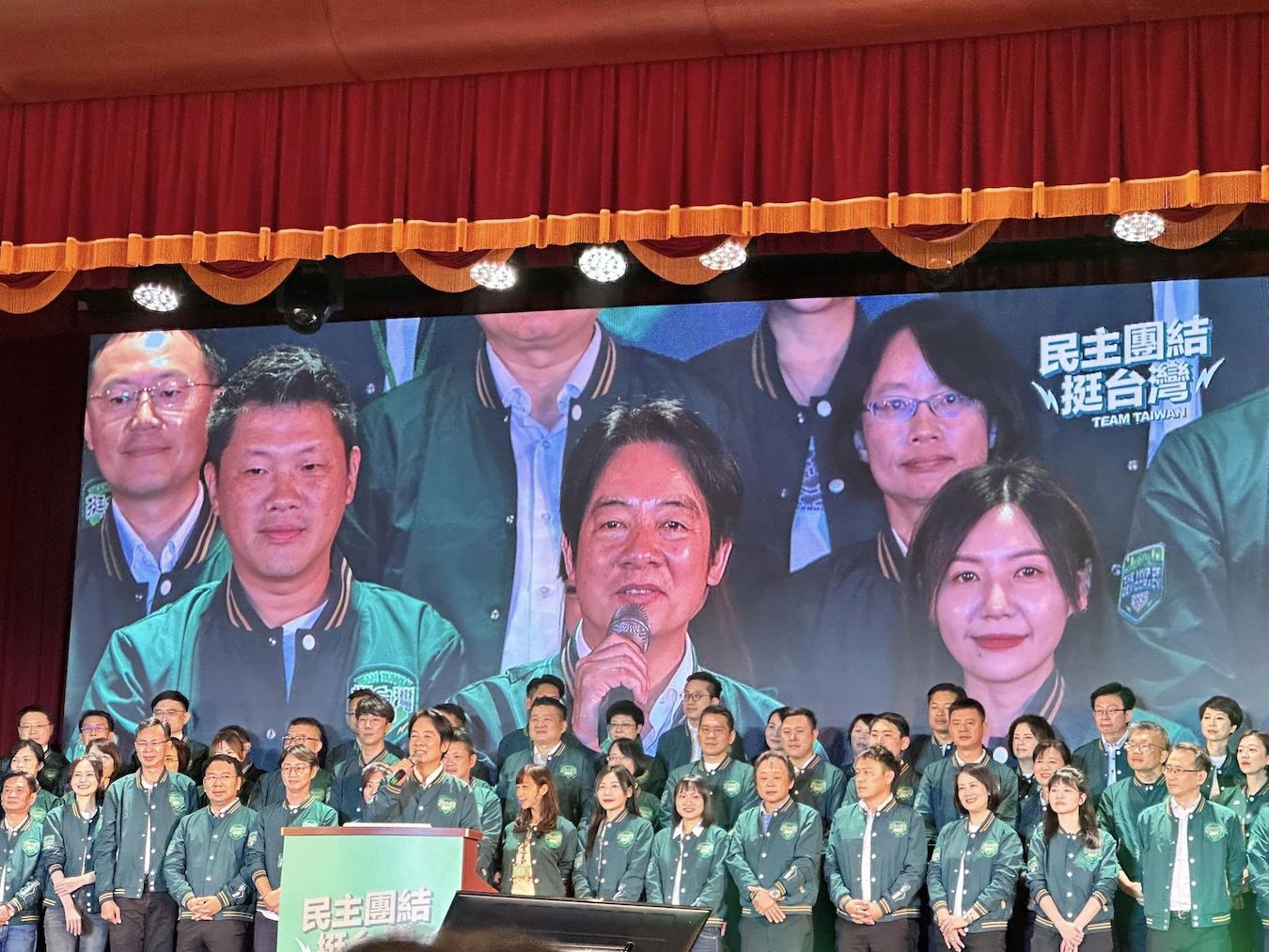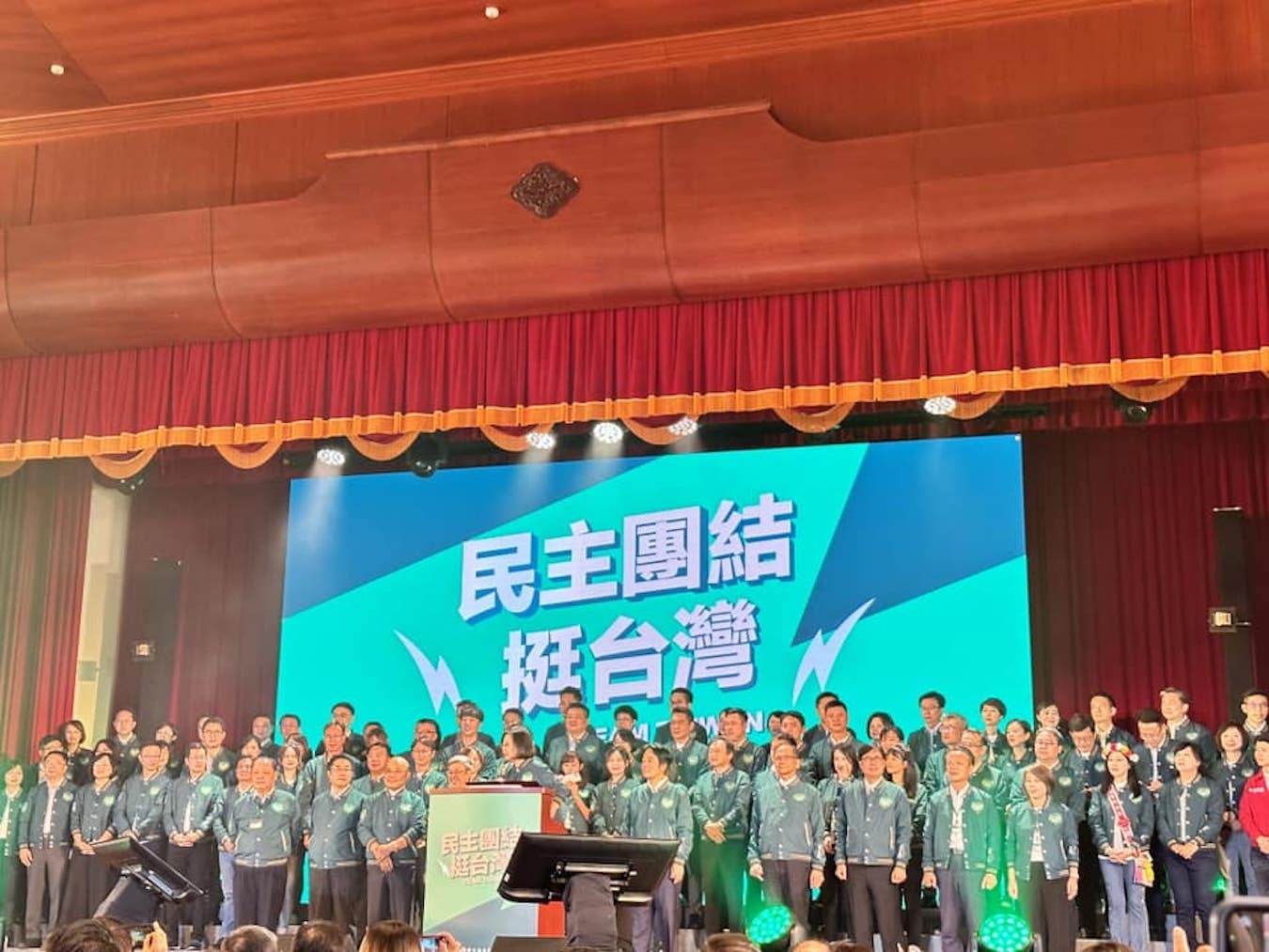by Brian Hioe
語言:
English
Photo Credit: 賴品妤/Facebook
THE DPP HELD its party congress on Sunday at the Grand Hotel. This took place on the same day as the rally organized by former NPP chair Huang Kuo-chang and streamer Holger Chen on Ketagalan Boulevard. As no representative of the DPP was present at the rally, which all pan-Blue presidential candidates attended, this led to DPP party members being derided by Huang as off enjoying air conditioning while attendees at the rally toiled in the heat. Though the rally framed itself as non-partisan, given that all pan-Blue presidential candidates were present, the rally is largely read as pan-Blue.
The party congress involved the finalization of the DPP’s slate of candidates, as well as speeches by current president Tsai Ing-wen and presidential candidate William Lai.
 Photo credit: 顏若芳/Facebook
Photo credit: 顏若芳/Facebook
Overall, there were few surprises. The DPP will maintain a slate that runs former Sunflower Movement activists such as Wu Cheng and Tseng Po-yu in Taipei and New Taipei as providing a young face for its overall slate–even if most of its candidates are not youth candidates. Though Wu and Tseng were historically independent candidates, they have since joined the DPP. On the other hand, the DPP will cooperate with some pan-Green independents such as Miao Poya of the SDP. But the DPP will run against the TSP in Yilan County and in Taipei District 4. The DPP will not cooperate with the NPP, with ties between both parties having long since soured–even if NPP chair Claire Wang demonstrated the party’s continued pan-Green orientation at the rally on Ketagalan Boulevard by attending the event but giving a speech that attacked the notion of framing alignment with pan-Blue presidential candidates as “non-partisan.”
In her speech, Tsai touted the success of her administration on a number of fronts. This was with regard to Taiwan’s successes in fighting off COVID-19, providing economic relief measures to small-to-medium-sized enterprises affected by COVID-19, strengthening ties with democratic fellow countries, and raising wages. Similarly, Tsai touted new programs such as the TPASS commuter pass for northern Taiwan, and subsidies for high schoolers and college students. To this extent, Tsai also brought up concerns about housing justice, emphasizing efforts to speed up the construction of social housing, provide subsidies to tenants, and raise taxes on those that own multiple properties or “hoard” properties.
Nevertheless, Tsai highlighting her accomplishments was primarily to frame William Lai as her successor, who would carry on these policies. Tsai brought up her faith that Lai would have a significant role to play in Taiwan’s future, as not only attested to by their record working together but with regards to when Lai challenged her for the DPP’s 2020 presidential nomination.
This has proved a source of tension between Tsai and Lai in the past, with Tsai rumored to have wanted to prevent Lai from becoming the DPP’s presidential candidate in the past, in favor of candidates she would have more influence on such as current Premier Chen Chien-jen or former Taoyuan mayor Cheng Wen-tsan. It is generally thought that Tsai will continue to be a powerful factional figure in the DPP once she leaves office. Yet Tsai is clearly indicating that, seeing as Lai is now the DPP candidate, he has her support.
Indeed, Lai sought to frame himself as continuing Tsai’s policies. Lai has particularly sought to reassure the US and western powers that he would not push for any provocative pro-independence policy, in line with past statements by him as mayor of Tainan in which he claimed to be a “pragmatic worker for Taiwanese independence.” By contrast, Lai has sought to frame himself as continuing Tsai’s moderate cross-strait policy, which would involve continuing to adhere to the status quo.
Nevertheless, one notes that both Tsai and Lai’s comments at the DPP party congress were primarily intended for domestic consumption, and neither Tsai nor Lai really emphasized the point of adherence to the status quo as their main focus in comments. Instead, both highlighted continuity in domestic policy and continued efforts to strengthen ties internationally. Though the KMT will likely frame the Tsai administration’s successes in strengthening links with the US and western powers as provocative of China, the DPP is not likely to deviate course on this in the face of criticism.
 Photo credit: 顏若芳/Facebook
Photo credit: 顏若芳/Facebook
Otherwise, the DPP passed resolutions to prevent candidates with criminal records from running for office. This is mostly symbolic, seeing as the DPP had already finalized its slate of candidates, but the DPP seems to be firmly conscious of the fact that some party members have become implicated in corruption scandals or links to organized crime and that this could prove a weak point for the party. One notes that this came up at the rally on Ketagalan Boulevard, in which the DPP was accused of having become too close to organized crime and fraud groups. In the coming election cycle, the KMT may, too, come under scrutiny for such links. But the DPP may have more to lose, as the incumbent party.
What did not come up to a significant extent was the #MeToo allegations that swept through the DPP and later also affected the pan-Blue camp. This may reflect that #MeToo allegations are no longer seen as only affecting the DPP, with the spread of such allegations to the KMT, and then to entertainment, cultural, and academic circles. Even so, the legislature is set to hear amendments to laws on gender equality in a special session in the coming days.
The die is cast for elections, then, where the DPP is concerned. It is to be seen how the election cycle plays out.

